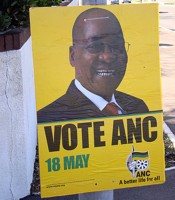Editor's note: This is the second of a two-part series on South African President Jacob Zuma's political prospects as leader of both the African National Congress and South Africa. Part I examined some of Zuma's recent successes in consolidating his political position within the party. Part II examines his weaknesses and failures, which risk undermining his future prospects.
At its June policy conference in Midrand, the African National Congress (ANC) took pains to make clear that its policy discussions were a separate matter from the broader question of the party’s future leadership. That argument, however, carried little weight with analysts of South African politics, who see the two as closely interwoven. In a movement whose divisions have been laid bare in recent years, the party’s positions on certain policy issues are interpreted as indicators of the strength of particular leaders and factions. In this light, despite having entered the conference on a relative high, and though he did not suffer an unambiguous defeat, South African President Jacob Zuma left the Midrand gathering having failed in three main areas, potentially damaging his re-election prospects in the process.
First, his support for a document called the “Second Transition” was insufficient to save it from a critical mauling by conference delegates for its lack of substance and theoretical rigor. The document is a call for a socio-economic transformation to follow the country’s political or “first” transition. However, the ANC has never recognized distinct political and socio-economic stages in its work and has claimed to be pursuing both simultaneously. Indeed, the call for a second transition represents an implicit and damaging admission that many of the ANC’s socio-economic initiatives since 1994 have failed to deliver transformation.

